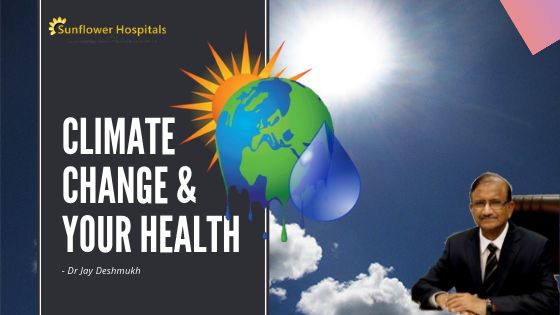Climate Change & Your Health | Sunflower Hospital Nagpur | Dr Jay Deshmukh :- Global warming has multiplied our health concerns enormously. In recent times there has been a sudden increase in cases of malaria in developed countries, dengue fever, tick borne diseases , certain cancers, psychiatric diseases and many more. There has been a significant impact due to warmer oceans and warmer and wetter climates.
What is global warming and climate change ?
- Climate Change & Your Health | Sunflower Hospital Nagpur | Dr Jay Deshmukh :- The increase in Earth’s average surface temperature due to rising levels of greenhouse gases is global warming. Within scientific journals climate change refers to a long term change in Earth’s climate or a region on Earth.
What is green house effect ?
- Climate Change & Your Health | Sunflower Hospital Nagpur | Dr Jay Deshmukh :- The green house efffect is the process by which radiation from a planets atmosphere warms the planet’s surface. This would not happen without its manmade atmospheric change.
What are the green house gases ?
- Climate Change & Your Health | Sunflower Hospital Nagpur | Dr Jay Deshmukh :- The four major gases that contribute to greenhouse effects are water vapour, carbon dioxide, methane and ozone. Atmospheric concentrations of carbon dioxide, methane and nitrous oxide are unprecedented in at least the last 80,000 years. They have contributed significantly to global warming.
What are the key facts of global warming and climate change on our health ?
- Climate Change & Your Health | Sunflower Hospital Nagpur | Dr Jay Deshmukh :- The social and environmental determinants of health include clean air, safe drinking water, sufficient food and shelter. Climate change affects these social and environmental determinants. Between 2030 and 2050, climate change is expected to cause 250,000 additional deaths per year due to malnutrition, malaria ,diarrhoea and heat stress. Areas with weak health infrastructure like India will be the least able to cope up with this challenge. Reducing emissions of greenhouse gases through better transport, food and energy use can result in improved health, particularly through reduced air pollution.
Would there be a change in pattern of infections due to climate change ?
- Climate Change & Your Health | Sunflower Hospital Nagpur | Dr Jay Deshmukh :- Climatic conditions strongly affect water- bone diseases and diseases transmitted by vectors. Climatic changes are likely to lengthen the transmission seasons of important vector borne diseases and their geographic range. For example Malaria is strongly influenced by climate. Malaria kills 400,000 people every year . Most of them are African children under 5 years old. The Aedes mosquito vector of Dengue is also highly sensitive to climate change and recent studies indicate that Dengue will continue to torment us due to climatic changes. The sudden increase in Scrub typhus and Hantavirus disease in recent years is also likely to be due to global warming and climate changes.
How would one measure the health effects from climate change ?
- Climate Change & Your Health | Sunflower Hospital Nagpur | Dr Jay Deshmukh :- Assuming economic growth and better health facilities the WHO has concluded that there would be additional 250,000 deaths annually between 2030 and 2050. There would be 38,000 deaths in elderly people due to heat exhaustion, 48,000 due to diarrhoea, 60,000 deaths due to malaria and 95,000 deaths due to childhood under nutrition.
What impact would climate change leave on an individual ?
- Climate Change & Your Health | Sunflower Hospital Nagpur | Dr Jay Deshmukh :- Power shortage in extreme weather would cripple hospitals and transportation . Crop declines could lead to under nutrition, hunger and higher food prices. More CO2 in air would make staple crops like wheat and rice less nutritious. Heat stroke would rise amongst farmers and construction workers. Labour could shift from dawn to dusk but at the risk of more insects coming out at night. Hotter days , more rains and higher humidity will produce more ticks, which spread infectious diseases like many hemorrhagic fevers. Trauma from flood, droughts and heat waves can lead to mental health issues like anxiety, depression and suicide. More heat would mean more longer allergic seasons and more respiratory diseases. More rains increase mold, fungi and indoor air pollutants. Mosquito bone Dengue fever has increased 30 fold in last 50 years. Senior citizens and poor children tend to be most vulnerable to heat related illnesses. Drought and chronic water shortages affects millions of people living particularly in rural areas.Rising sea levels can threaten fresh water supplies. More severe storms can cause city sewage systems to overflow.
How to face this challenge of global warming and climate change?
- Climate Change & Your Health | Sunflower Hospital Nagpur | Dr Jay Deshmukh :- We need to get charged up with renewable energy. With costs dropping, renewable energy is the best choice for the environment and the economy. Green your commute by taking a public transport, ride a bike, car -share, switch to an electric or hybrid vehicle. Change to energy efficient light bulbs, unplug computers, TV and other electronics when not using them. Wash clothes in warm or cold water, not in hot water. Look for energy star labels when buying new appliances. Consume less, waste less, enjoy life more.
What to eat for a climate stable climate ?
- Eat meat free meals, buy organic and local whenever possible, do not waste food and try to grow your own.
Global warming and climate change are slowly but surely affecting our health adversely. Each one of us needs to take this as our personal challenge. Avoid air pollution, avoid plastics that are not biodegradable , use water carefully and do not waste a drop of water. Use of renewable energy, minimising use of petroleum products, avoid burning waste are few important measures. Go green.

11November
Categories :
Uncategorized

